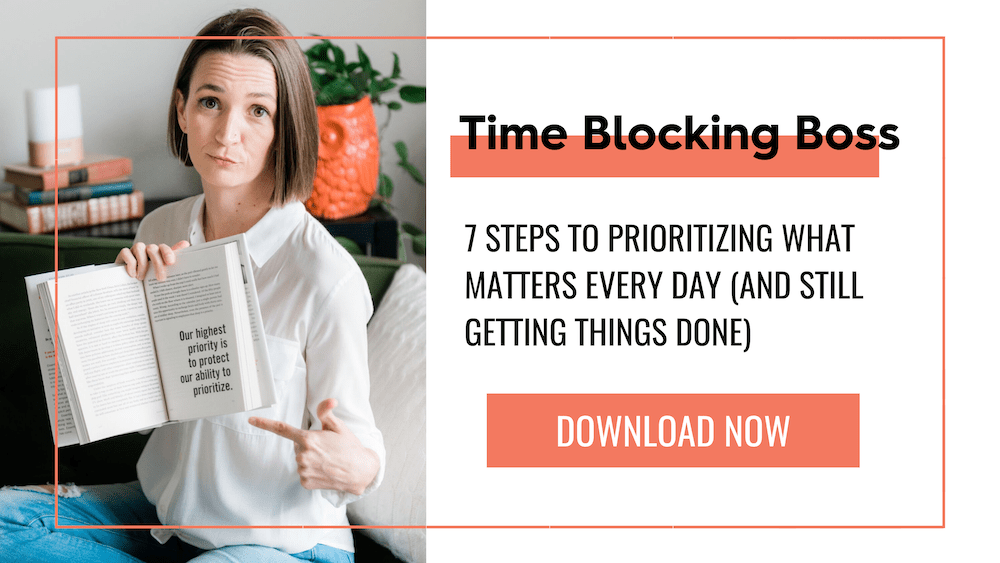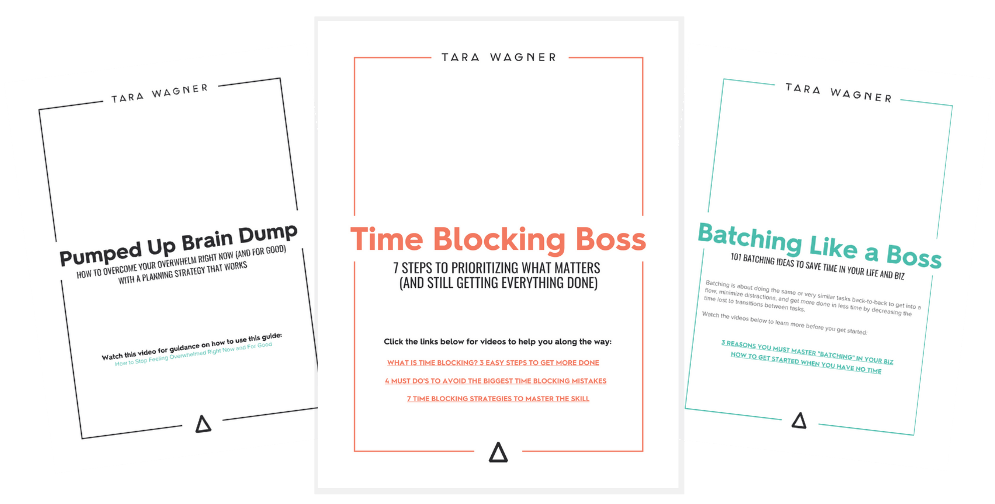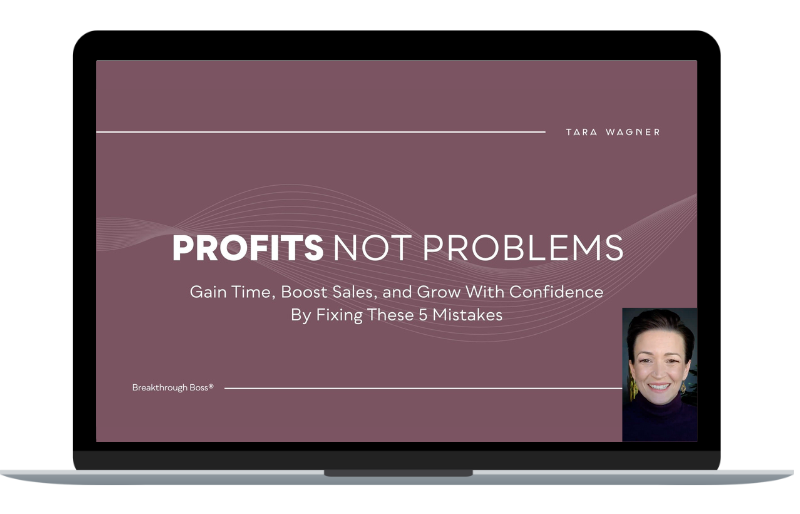
I’m going to walk you through how to start a business.
I meet so many people who are in the situation of having a full-time job, having a family, having health issues, having something in their life that’s limiting their availability and they think that because of that they can’t build a business.
We hear all the stories out there that you have to work 100 hours/week and you gotta hustle, hustle, hustle and you gotta burn yourself out and that’s how you get to be successful. I’m here to tell you there are so many people out there that are working 50 – 60 – 80 – 100 hours a week and are going at the same pace as somebody who is working 10 productive hours a week.
Watch here or read on below:
I’m gonna walk you through eight questions, so grab a pen and paper.
I want you to write them down and either answer them now or think of them as “these are the things that I need to answer to give me the clarity, to give me the direction, to be able to allow me to create a business in 10 hours a week – 10 productive hours a week“
This is going to show you what you need to focus on, the things that you need to avoid, where to spend your time, who to be focusing on, so that you can actually make progress in those hours so that you can climb out of whatever situation you’re in now not feeling like you’re trapped there forever just because you don’t have massive amounts of time to create something else.
I’m Tara Wagner, Breakthrough Coach and lifelong entrepreneur. I help my fellow entrepreneurs to master the mindset and the skills necessary to crush their goals not their soul. If that sounds like your jam be sure to give this video a thumbs up and check out the others on my channel. Also be sure to check out the Breakthrough Boss Inner Circle in the link in the description to learn more about how I can support you in both the mindset and the skills necessary to start your business even in 10 hours a week.
Okay, so 8 questions I’m gonna break this down into two categories: mindset and skillset. One is to get yourself prepared, primed, in the right place so that you’re doing the right things. The other is to make sure that you are doing the right things. So again grab a pen, grab a paper, you’re not going to be able to answer all of these in one sitting. These are things, though, that you want to be able to figure out or be able to answer to give you that clarity that you’re looking for.

Question #1 – “What are my doubts worries and fears about building this business or being successful?“
Now this is not something that you are going to necessarily know all at once these things come up throughout the process but you want to be able to be very aware, very mindful of what are the things internally that are going to trip me up on this? Where am I worried that people are going to think a certain thing? Or you know I’m afraid that I can’t do a certain thing.
Whatever it might be that comes up for you, what I want you to do is think of those things as the things that you get to tackle in your mindset work every single day.
So you really want to know what these are so that you know how to focus on them, how to develop yourself, and how to develop your confidence around handling challenges that might come up.
Question #2 – “Who or what do I need to be to be able to build this business?“
Who or what do you know you get to be in order to do this? (I would love for you to comment below with an answer that you have on this)
When I first answered this question it was self-disciplined, organized, all the things that people know of me or know about me today. It wasn’t where I started but because I was truthful with myself and I was able to say you know what these are the things that are going to hold me back, and these are the areas of personal development that I get to focus on… it allowed me to be able to grow those things over time to a level of – I wouldn’t necessarily call it mastery in some of those areas, I’m not the most organized person – but I’ve been able to get it to a place where it’s no longer my pitfall. It’s no longer holding me back, it’s not a gap in my business anymore.
So, really ask that of yourself, who or what do you get to be if you want to be successful? And that’s going to show you what it is you get to develop within yourself.
These are the two main mindset questions that I want you to ask yourself and I want you to start doing mindset work around the answers that you come up with. But I don’t want you to think of this within your 10 hours, right?
When we’re talking about 10 hours building a business we’re not spending two or three or five of those hours on mindset work we’re spending 10 business hours on business tasks and we’re going to get into those with the next questions but what I want you to start doing is thinking about “when and where can I be doing this mindset work?“, maybe it’s on a lunch break, maybe it’s before work, maybe it’s before bed. “What can I do to build into my week the personal development that I need to be able to continue to move forward in this goal?”
And if you want a little bit of inspiration in terms of how to create a personal development plan check out this video on exactly how to do that.

Question #3 – “Who do I get to serve?“
Who is my business here to serve? This right here should be a question that you can answer inside and out, frontwards and backward, five times from Sunday or whatever that phrase is, (I think I just butchered it). My point is: you need to know your people – your ideal client avatar – as you’re gonna hear it be called over and over and over again.
You need to know:
- Where they’re hanging out
- What it is they’re needing
- What their concerns are about the thing that you provide whether it’s a product or a service
- What it is that they’re frustrated about with previous products or services like yours
- Everything about them (basically)
That’s going to give you the clarity in terms of what you’re creating, your price points, your marketing, where you’re showing up on social media, who you’re connecting with, where you put your ads, everything comes down to the answers that you get when you fully understand your ideal client.
So “Who do I serve?“. Know that answer inside and out, 17 different ways, 17 million different ways, the deeper you understand the client the more successful you’re going to be.

Question #4 – “What do I need to learn?“
This kind of goes along with the personal development that we were talking about before but what I want you to think about is: “With my particular industry, the work that I’m doing in my business – What are the primary skills necessary in this industry?”
So you might realize it’s advertising – Facebook ads or Google ads, social media marketing, email marketing, whatever it might be. What are the top 2-3 skills that are gonna serve you and take you the furthest? Maybe it’s industry-specific skills.
If you’re a service provider maybe there’s a particular skill that you need to develop in the service that you provide so that you can provide a better service. What are the things that you know you get to learn in order to get really good at what you’re doing both what you’re providing and also running a business? Because those are two different things.
You can get into business because you’re good at what you do, you can get into business because you have a great idea of a product or a service, but that’s different than being good at business.
So what is it that you get to learn in those two arenas that are going to serve you and take you forward in your business? When you know the answer to this question this is going to help you to shore up any gaps and it’s going to help you to focus so that you can actually make more progress in a faster way because you’re not ignoring those gaps you’re making sure that you’re developing the most important things, the income-producing activities to your business.
Question #5 – “What are my income-producing activities?“
What are the things that when I do them they directly lead to sales in my business?
Product-based businesses and service-based businesses all have income-producing activities and income-supportive activities. Engaging on social media, answering your emails, most of those tend to be income-supportive activities but advertising, marketing, sales conversations, those are income-producing activities.
So for your industry and your business what are those things? And if you don’t know, where can you go to find that out?

Question #6 – “What are my time and money wasters and how will I protect against them?“
Everybody has ways that they love to waste time and waste money we’re so good at throwing time and money at a problem and it not being very useful. So I want you to know what your habits are.
- What do you tend to do when you’re wasting time?
- What do you tend to do when you’re wasting money?
- Also, What are the things that are going to waste your resources, your limited finite resources?
If you can know what those things are ahead of time you can then say “Okay, how do I protect against them? What can I do to set things up to prevent me from even being able to do that?”
So you’re maybe putting in some redundancies, you’re keeping your credit card way across the room, you’re doing whatever you can do to make sure that you’re not just buying up a whole bunch of stuff in your business, you’re not just getting into course after course after course that you’re not implementing, you are not scrolling through social media – like we’re all really good at doing these days.
What are the things for you and your personal life, in your personal business or industry that you know could waste your time and waste your money and what are you gonna do to protect against those?
Again, this might not be a question you know right off the bat but keep this question handy because you need to constantly be asking yourself, “Is this a time and money waster or is it an income-producing activity?” Because if it’s a waster you need to be aware of that as soon as possible to set up those protections so that you’re not going down that path.
This is why so many people can spend 80 hours in their business and only 10 of them are productive because we mistake busyness for business or movement for forward motion.
You want to make sure you’re moving forward not just around and around in circles so you get to be really super aware, asking yourself this question maybe on a regular basis, “Where have I wasted time or money this past week even and what can I do to protect myself from that in this coming week?”
Again, you have 10 hours a week to build your business, which means you have zero hours to screw around. You can’t be wasting time on something that’s not working, you need to go right to the source, you need to figure out what are the most effective things I can do in my business, and when I say right to the source, right to people who know. Look for examples of people who are doing it right and then model what works and stop testing a million things that you aren’t sure are working.

Question #7 – “How do I need to allocate my time each week in order to focus on my income-producing activities?“
I want to break this down for you in terms of percentages, but before you can even get into a weekly schedule I want you to set aside time to research your ideal client.
Especially if you’re first starting your business, or if you’re not clear on this question, set aside time to research your ideal client to really get to know them.
Do a lot of market research, really figure out what their needs are, what their pain points are, what they’re really after, what are their goals, what are they really looking for – understanding that inside and out. So your first several weeks, maybe even several months depending on how in-depth you want to go with this, can really be spent just in that area, just in doing your market researching and you’re planning – 100% of your time going towards that.
After that point when you have enough clarity (not perfect clarity because you can only get perfect clarity by getting in there and starting to take action on the business, actually starting to build it, getting real-life feedback in terms of what people are paying you for and then using that feedback) to course correct or gain more clarity.
But as soon as you have enough clarity to start taking that action in your business what I want you to start doing is taking that 10 hours a week, or however many hours you have, and allocating about 20 percent of it to your skill development.
What are the things that you get to learn in your business 20 percent of your time needs to go into developing those things?
80% of your time needs to go into your income-producing activities, meaning the things that bring in income. That’s where you’re spending the majority of your time. Everything else will fill in or get done when it happens to fill in or get done.
If you’ve seen the video we did on the jar of life and the big rocks I highly recommend you check that out.
Watch that one because when you understand that this is a big rock and you prioritize that big rock you will find little bits of time here or there to get finished the other little things that need to get finished, answer a couple of emails, or check in on things or whatever. But you want to use your solid 10 hours on solid income-producing activities or 80% of that time at least on those income-producing activities.
Now, why are we spending so much time on income-producing activities first even if that means your website looks ugly? Notice I haven’t said anything in here about building a website, I haven’t said anything in here about necessarily building social media. I’m solely talking about income-producing activities.
Why do we focus on those first?
Because when you have income-producing activities you can start outsourcing the other things that will help move things further along so getting a good website, getting your social media growing, and doing those income-supportive activities that lead to more income-producing activities.

Question #8 – “What will I outsource first?“
Spoiler alert – you want to outsource things that will either give you more time so that you have more ability to double down on your income-producing activities or are income-producing activities in and of themselves.
So perhaps you’re going to invest in somebody who does sales or somebody who does ads or maybe you’re just going to invest in somebody to take care of admin, to take care of emails, to take care of graphics, to take care of social media so that you can be spending your time going out there and creating more business, more revenue in your business.
This is how you get out of the cycle of not having any time, you spend the time creating things that create income, that create time and then you take that and you invest it – leveraging somebody else’s time now, giving somebody else a job, giving somebody else revenue, helping them to help you so that you can create more and more and more until you can finally break out of that cycle.
Now you’re just running your business, not also having a job or doing something else on the side.
Even if your desire is to never have a full-time business, always have a part-time side hustle.
You can get a side hustle to a very profitable place using this system making sure that you’re focusing on income-producing activities and as you have income, investing it back into the business in ways that allow you to create more income. This is possible.
You can do this
I know it’s not easy, it’s going to be exhausting for a little while, it’s going to really stretch you. Most of it’s going to be mentally exhausting and physically exhausting, just the internal work that you’re going to be doing, the things you’re going to be confronting and having to figure out, and answering questions like this or doing the market research. This stuff isn’t easy, however, it is possible! You can do this.
Whatever limitations you have, it’s just going to require you to go into it with eyes wide open, with a lot of self-awareness, and with a lot of commitment to growth, to self-discipline, and to focus because it’s very easy to start doing 10 million things because everybody else is saying that’s the thing you need to do and that’s the thing that ends up breaking most entrepreneurs.
If you’ve seen my video on all of my health issues you know this is possible.
So, whether you have 10 hours a week or 20 hours a week to start your business you still get to figure out these questions so that you’re making sure you’re using those hours productively.
If you are in the beginning phases of starting a business, make sure you subscribe to my channel because in a couple of videos from now I’m going to have some more questions to ask yourself before you actually start that business.
FREE TIME BOSS BUNDLE!
To help you to do all of this, I’ve created a few free guides to walk you through these time blocking strategies!
It will help you make sure you’re time blocking the right things and every step laid out to help you along the way.
It’s called the Time Boss Bundle, and you can download it for free by clicking the image above or click here to learn more.
What about you, boss lady?
What’s your 10 hour per week business?
Scroll down to leave your comments below.





